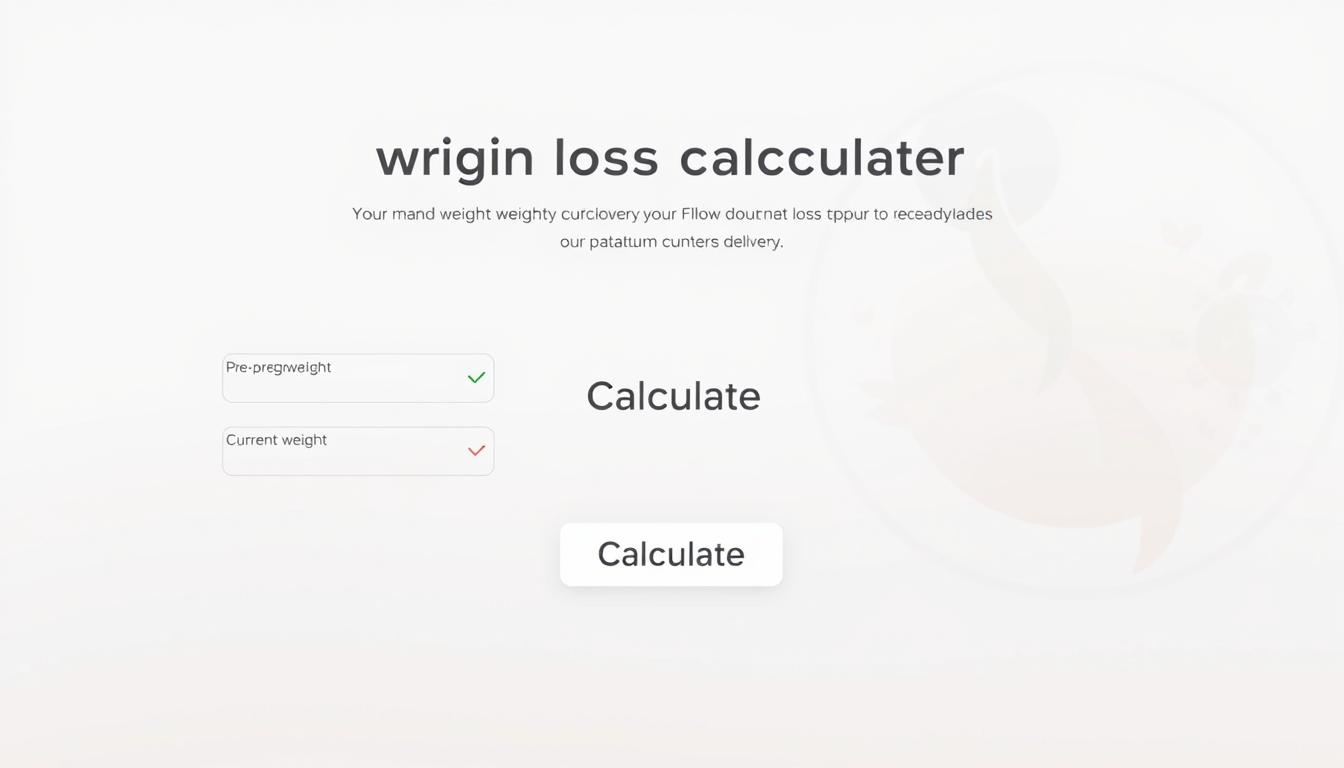“The greatest wealth is health.” – Virgil. This timeless quote resonates deeply with new mothers navigating the complexities of postpartum weight loss.
As new mothers, you’re not just recovering from childbirth; you’re also on a journey to regain your pre-pregnancy body and health. Our weight loss after pregnancy calculator is designed to support you in setting realistic expectations and achieving your health goals.
Understanding that every woman’s postpartum journey is unique, our calculator considers multiple factors, including pre-pregnancy weight, weight gain during pregnancy, and whether you’re breastfeeding. This personalized approach helps you establish achievable weight loss goals that prioritize both your health and your baby’s well-being.
Key Takeaways
- Our weight loss calculator is tailored to support new mothers in achieving their health goals.
- A gradual weight loss approach is recommended, with most healthcare providers suggesting no more than 1-2 pounds per week.
- Breastfeeding mothers require additional calories, and our calculator takes this into account.
- Retaining some weight after childbirth is normal and part of the body’s recovery process.
- A customized approach to postpartum weight management is crucial for long-term health.
Understanding Postpartum Weight Loss
Understanding the nuances of postpartum weight loss is crucial for new mothers aiming to achieve their weight goals. Postpartum weight loss is a complex process influenced by various physiological and lifestyle factors.
During childbirth, women typically lose around 10-13 pounds due to the baby, placenta, and amniotic fluid. However, additional weight loss occurs gradually as the body sheds excess fluid. Breastfeeding can aid in weight loss by burning an extra 250-500 calories per day, although this can vary among women.
Why Postpartum Weight Loss Is Different
Postpartum weight loss differs significantly from regular weight loss due to hormonal fluctuations, the need for physical recovery, and potential breastfeeding. The body’s metabolic rate changes during pregnancy and continues to adjust postpartum, affecting the rate of weight loss. Hormonal changes, particularly elevated prolactin levels in breastfeeding mothers, impact how the body stores and releases fat.
Setting Realistic Expectations
Setting realistic expectations is vital for new mothers. Postpartum weight loss typically takes 6-12 months, not weeks. Factors such as pregnancy weight gain, pre-pregnancy weight, age, and physical activity levels influence individual weight loss timelines. Breastfeeding mothers need to balance weight loss goals with adequate nutrition to maintain milk supply, requiring a more gradual approach.
Weight Loss After Pregnancy Calculator
Our weight loss after pregnancy calculator is designed to help you understand your daily calorie needs and achieve a healthy weight loss. Losing weight after pregnancy can be challenging, but with a personalized plan, you can reach your goals.
How Our Calculator Works
Our calculator uses the Mifflin-St.Jeor Equation to calculate your basal metabolic rate (BMR), then adds calories for your physical activity level. For breastfeeding mothers, an additional 250-500 calories are added based on infant age and milk production. This ensures that you have a comprehensive understanding of your daily calorie needs.
The calculator first establishes your BMR using your current weight, height, and age. We then factor in your physical activity level, ranging from sedentary to very active, to calculate your total daily energy expenditure.
Factors That Affect Your Calorie Needs
Several factors affect your calorie needs, including your current weight, height, age, physical activity level, breastfeeding status, and how many months postpartum you are. Understanding these factors is crucial for achieving a healthy weight loss.
For breastfeeding mothers, our calculator adds the appropriate amount of additional calories needed to support milk production. This ensures that you are fueling your body and your baby adequately.
Interpreting Your Results
Your results will show your maintenance calorie needs and a recommended daily calorie intake for healthy weight loss. The calculator provides a realistic timeline for reaching your goal weight based on a safe rate of weight loss (typically 1-2 pounds per week).
We recommend tracking your food intake for several days to establish your current calorie consumption before making adjustments based on calculator results. You can use our weight loss while breastfeeding calculator to get a more tailored estimate.
Healthy Postpartum Weight Loss Strategies
Embracing a healthy lifestyle postpartum not only aids in weight loss but also supports overall maternal health and recovery. As new mothers, it’s essential to focus on gradual, sustainable changes that promote well-being and, if applicable, support breastfeeding.
A key aspect of postpartum weight loss is nutrition. Emphasizing nutrient-dense whole foods provides essential vitamins and minerals while supporting energy levels and milk production. A moderate calorie deficit of 250-500 calories per day can lead to a safe weight loss rate of 1-2 pounds per week. This approach helps in achieving a healthy weight without compromising milk supply or maternal health.
Hydration is also crucial, with recommendations suggesting at least 64-96 ounces of water per day for postpartum women. This supports both weight loss and milk production. Alongside dietary changes, physical activity should be gradually reintroduced after medical clearance. Starting with walking and gentle movements, new mothers can aim for 150 minutes of moderate activity per week.
Incorporating strength training 2-3 times per week can help rebuild muscle tone, boost metabolism, and support long-term weight management. Additionally, meal planning and preparation can ensure nutritious options are available, even on busy days with a newborn.
It’s also important to focus on non-scale victories like increased energy, improved mood, and better physical function. Postpartum weight loss is a gradual process that may take 6-12 months or longer. Therefore, patience and a supportive plan are crucial. Consulting with healthcare providers before starting any weight loss plan is essential, particularly for women with complications during pregnancy or delivery.
In conclusion, a healthy postpartum weight loss journey involves a multifaceted approach that prioritizes maternal health, nutrition, and gradual physical activity. By setting realistic goals and focusing on overall well-being, new mothers can achieve a healthy weight and improve their overall quality of life.


